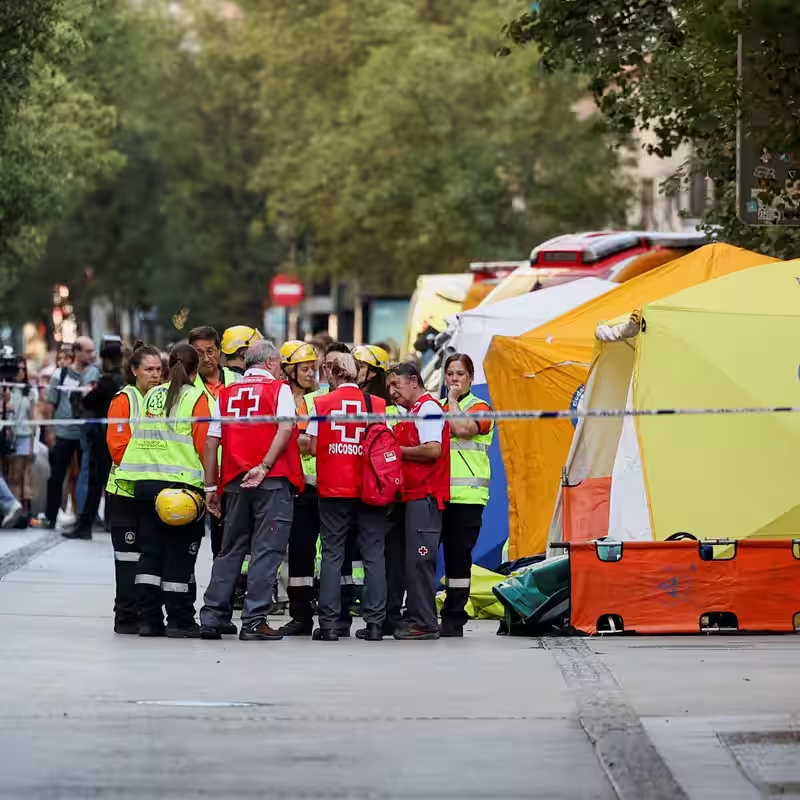A tragic accident in the heart of Madrid has left the city—and the construction industry—reeling. On Tuesday, October 7, 2025, a building under renovation collapsed during work hours, claiming the lives of four construction workers. The incident, which occurred just steps from some of Madrid’s most iconic landmarks, has raised urgent questions about structural safety, oversight, and accountability.
Table of Contents
- What Happened in Madrid?
- Victims and Eyewitness Accounts
- A Troubled Building History
- Ongoing Investigation and Possible Causes
- Who’s Behind the Project?
- Lessons for Construction Safety
- Sources
What Happened in Madrid?
At approximately 1 p.m. on Tuesday, a section of the sixth floor of a six-story building in central Madrid gave way without warning. The collapse triggered a domino effect, pulling down multiple floors beneath it. The structure—originally built in 1965 as office space—was undergoing major renovations to transform it into a four-star hotel set to open in 2026.
Emergency crews rushed to the scene near the Royal Palace, Plaza Mayor, and Teatro Real—prime tourist territory. Initially, officials feared the workers were trapped alive. But by early Wednesday morning, all four missing individuals had been recovered from the rubble… deceased.
Victims and Eyewitness Accounts
The victims included three men and one woman, all employed by the construction firm handling the renovation. While their identities haven’t been publicly released, local media reports confirm they were experienced professionals.
Witnesses described the moment of collapse as terrifying. One told Spain’s public broadcaster RTVE: “It sounded like a bomb—but it lasted longer.” Another said they felt a tremor “like an earthquake.” The sheer force of the collapse sent debris flying and shook nearby buildings.
A Troubled Building History
This wasn’t the first red flag about the building’s condition. According to Madrid’s construction registry:
| Inspection Year | Result | Noted Issues |
|---|---|---|
| 2002 | Unfavorable | Structural integrity, facade, plumbing |
| 2012 | Unfavorable | Foundations, roof, sanitation |
| 2022 | Unfavorable | Multiple structural concerns |
Despite these repeated warnings, the building was sold in 2022 for €24.5 million (roughly $29 million) to RSR Singular Assets Europe, a Saudi-based real estate firm with holdings across Spain and Portugal.
Ongoing Investigation and Possible Causes
Madrid Mayor José Luis Martínez-Almeida confirmed that city officials had issued a construction permit in February 2025. He also noted that no formal complaints about the renovation work had been logged—but admitted authorities are now conducting a “thorough review” to ensure nothing was missed.
Crucially, Martínez-Almeida pointed to one potential factor: “It’s obvious that there was material piled up on the 6th floor, and therefore, it could have influenced the building’s collapse.” Overloading floors during construction is a known risk—especially in older structures.
Who’s Behind the Project?
The renovation was being managed by Rehbilita, a Madrid-based construction company with numerous local projects. The owner, RSR Singular Assets Europe, has not issued a public statement. Neither company responded to media requests for comment as of Wednesday.
Lessons for Construction Safety
This tragedy underscores the critical need for rigorous structural assessments—especially when converting aging buildings. Experts warn that aesthetic upgrades shouldn’t override engineering realities. Regular third-party audits, load testing, and transparent reporting could prevent future disasters.
Key Takeaways:
- Repeated “unfavorable” inspections should trigger mandatory interventions.
- Construction permits don’t guarantee safety—ongoing monitoring is essential.
- Worker safety must never be compromised for project timelines or profits.
Sources
The New York Times: “4 Workers Die in Collapse at Hotel Site in Madrid”
RTVE News (Spain)




